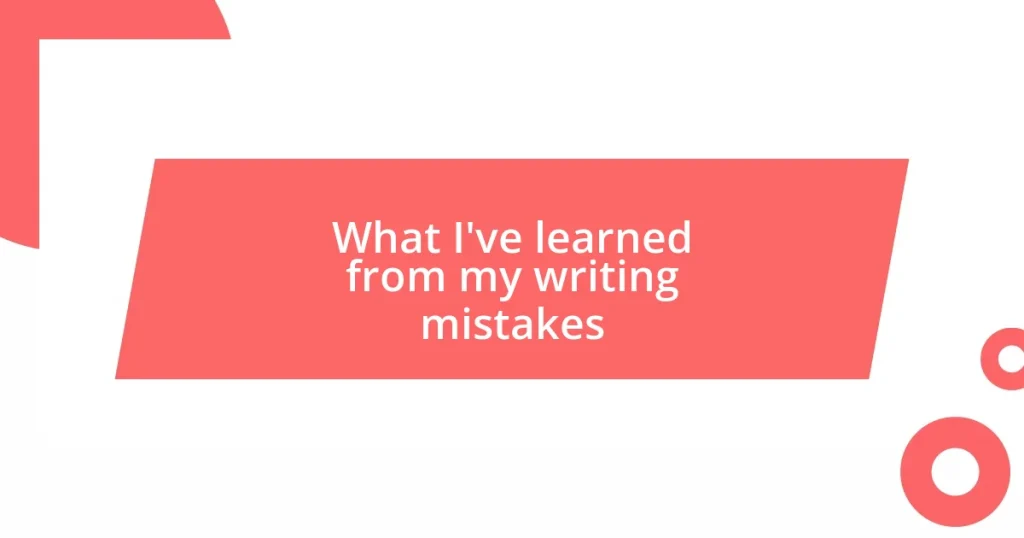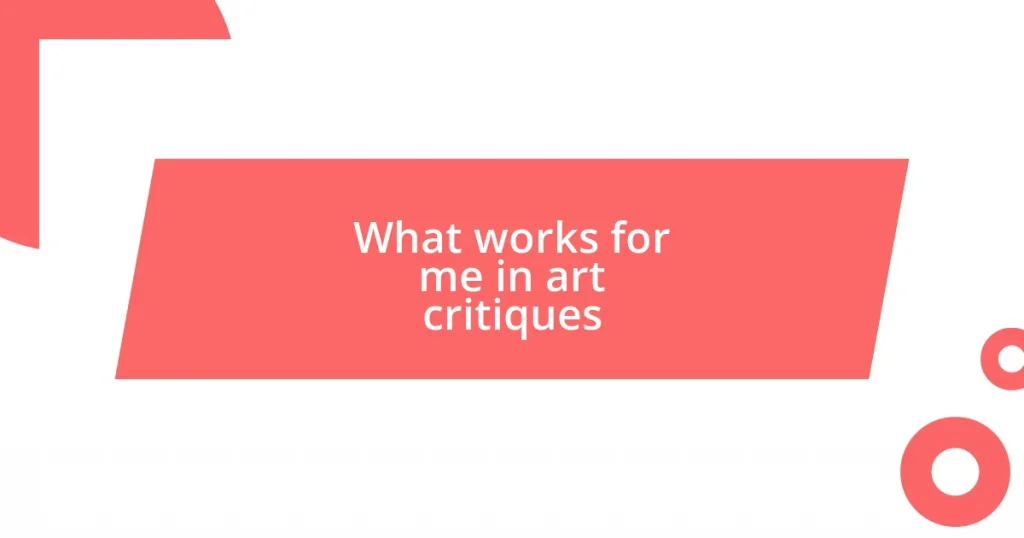Key takeaways:
- Understanding your audience is crucial for effective communication and prevents alienation through jargon and technical terms.
- Establishing a revision routine and stepping away from drafts enhances clarity and objectivity, allowing for more effective corrections.
- Celebrating progress, even small milestones, fosters motivation and acknowledges growth in the writing journey.
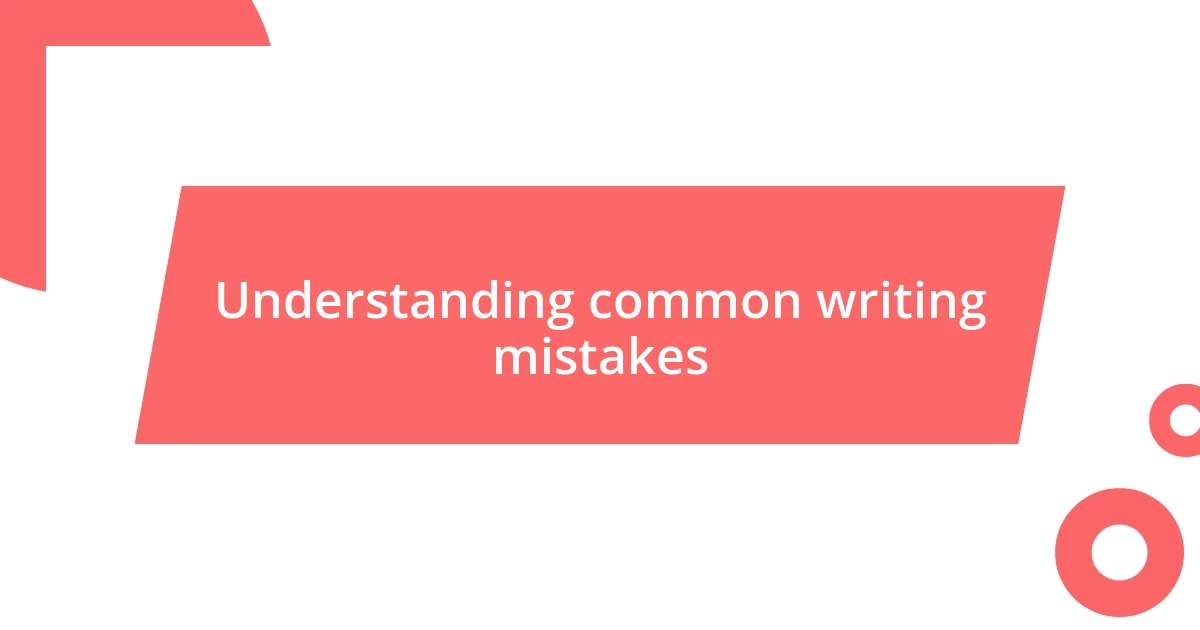
Understanding common writing mistakes
One common mistake I’ve encountered in my writing is not considering my audience. Early on, I remember crafting an article filled with jargon and technical terms, thinking it showcased my knowledge. The reality hit hard when I received feedback that my readers felt alienated rather than informed. Have you ever felt that disconnect with your audience? It’s such a crucial lesson—understanding who will read your work transforms how you communicate.
Another frequent stumbling block is overlooking the importance of structure. There were times I unleashed my thoughts onto the page, only to realize later that they lacked a coherent flow. I learned this the hard way when a piece I was proud of fell flat because the logical progression wasn’t evident. Isn’t it frustrating when your ideas get lost in a jumble? Establishing a clear beginning, middle, and end can make all the difference in guiding your readers through your thoughts.
Lastly, overusing adverbs and adjectives can clutter your writing. I used to sprinkle them everywhere, believing they added flair. However, I soon realized that strong verbs and nouns deliver a punch far more effectively. Have you noticed how some writing feels crisp and powerful? It’s because the author chose words wisely, giving it clarity and impact without unnecessary embellishments.
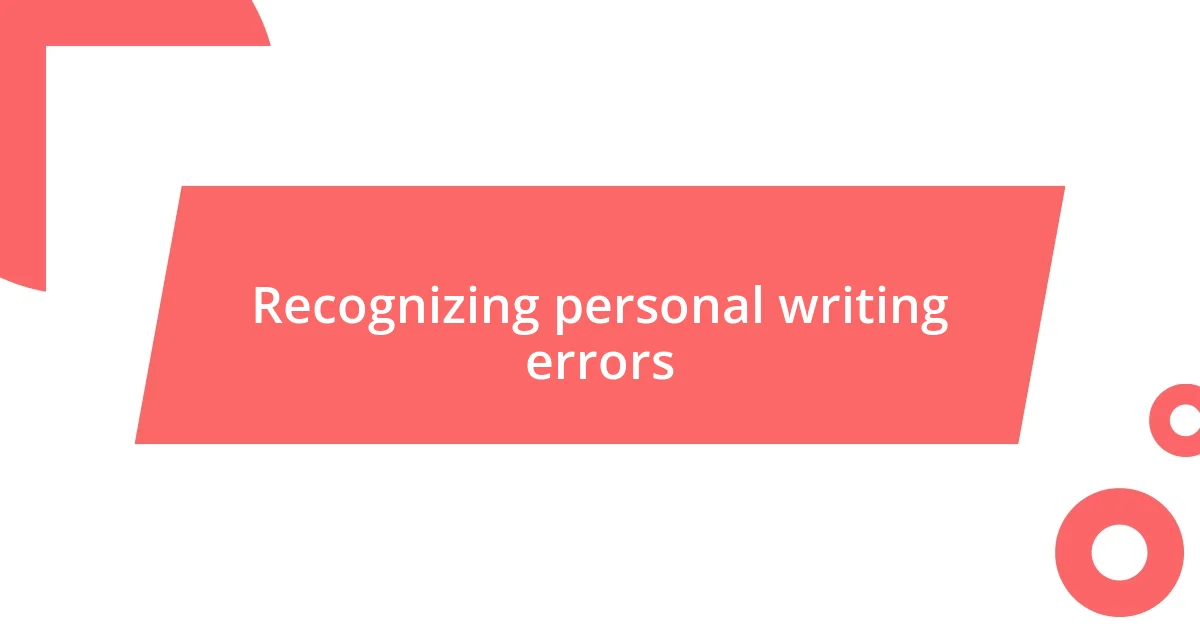
Recognizing personal writing errors
Recognizing personal writing errors often begins with a honest reflection on my work. One insightful moment for me came during a writing workshop where my peers pointed out repetitive phrases that I hadn’t noticed. Realizing that I was stuck in a pattern highlighted the need for vigilance; it’s like cleaning out a closet—you don’t always see the clutter until someone else shines a light on it.
Another experience that helped me identify my writing errors was reviewing past pieces after some time had passed. I was shocked by the inconsistencies in my tone and style. It’s fascinating how stepping back from my work allows me to spot mistakes that were completely invisible at first glance. Do you ever revisit your old work? It can feel a bit like discovering a time capsule of your growth as a writer.
One of my biggest challenges has been to recognize when I’m being too verbose. I recall a time when I submitted an article, only to have my editor send it back with suggestions to trim it down. It stung a little, but now I pay closer attention to wordiness. Have you ever felt that overwhelming urge to explain everything? I’ve learned that brevity often lends strength to my arguments and makes for a more engaging read.
| Common Errors | My Personal Experience |
|---|---|
| Repetitive Language | Feedback from peers revealed unnoticed patterns in my writing. |
| Inconsistent Tone | Revisiting old work showed me the evolution—and discrepancies—in my writing style. |
| Wordiness | Edit suggestions taught me the value of brevity for clarity and engagement. |
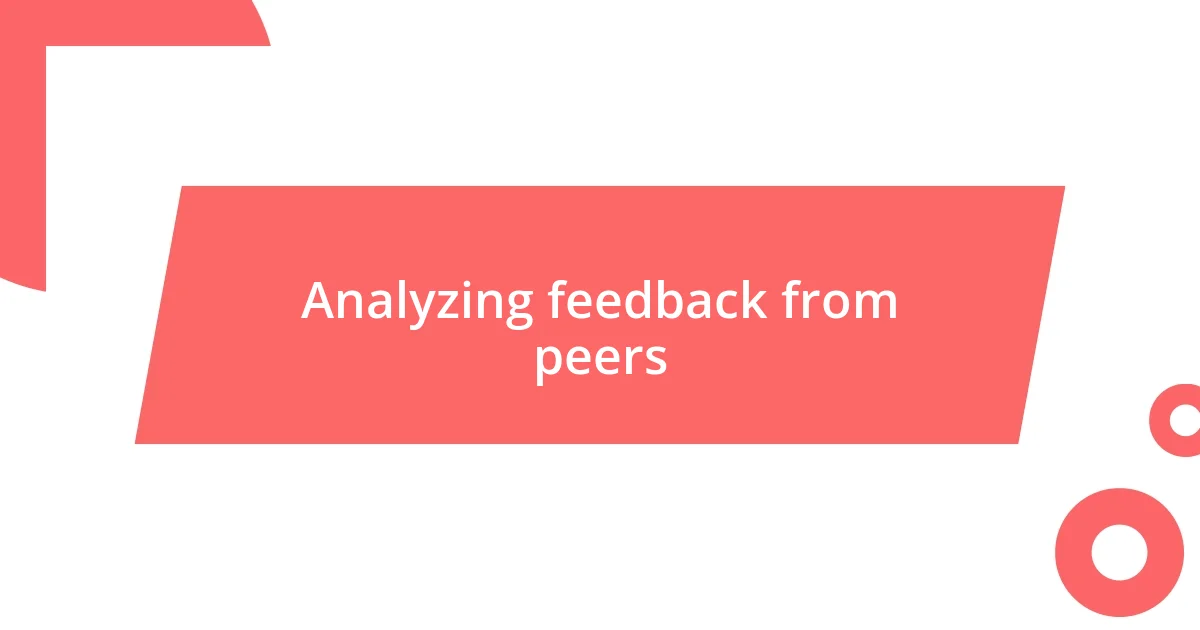
Analyzing feedback from peers
Analyzing feedback from peers has been a game-changer in my writing journey. I distinctly recall a moment during a group critique when a fellow writer pointed out how my narrative voice didn’t resonate with the intended emotion of the piece. It felt uncomfortable at first, but it opened my eyes to how much more powerful my writing could be if I learned to embrace this feedback. Have you ever experienced the sting of constructive criticism? Trust me; it can turn into a beautiful opportunity for growth.
When digesting feedback, it’s essential to approach it with an open mind. Here are some key takeaways I’ve come to appreciate:
- Separate Ego from Feedback: Understand that feedback is about the work, not you as a writer.
- Look for Patterns: If multiple peers cite similar issues, pay extra attention—they may be onto something important.
- Prioritize Constructive Criticism: Focus on suggestions that resonate with your larger writing goals and vision.
- Engage in Dialogue: Ask questions to clarify feedback; deeper discussion often uncovers valuable insights.
- Reflect on Emotional Reactions: Sometimes my first reaction to feedback was defensiveness, but acknowledging this response helped me process it more thoughtfully.
In my experiences, I’ve found that a single suggestion or observation from a peer can foster profound changes in my writing. I’ve learned to not just accept feedback, but to analyze it with curiosity and intention, turning every critique into a stepping stone for my growth.
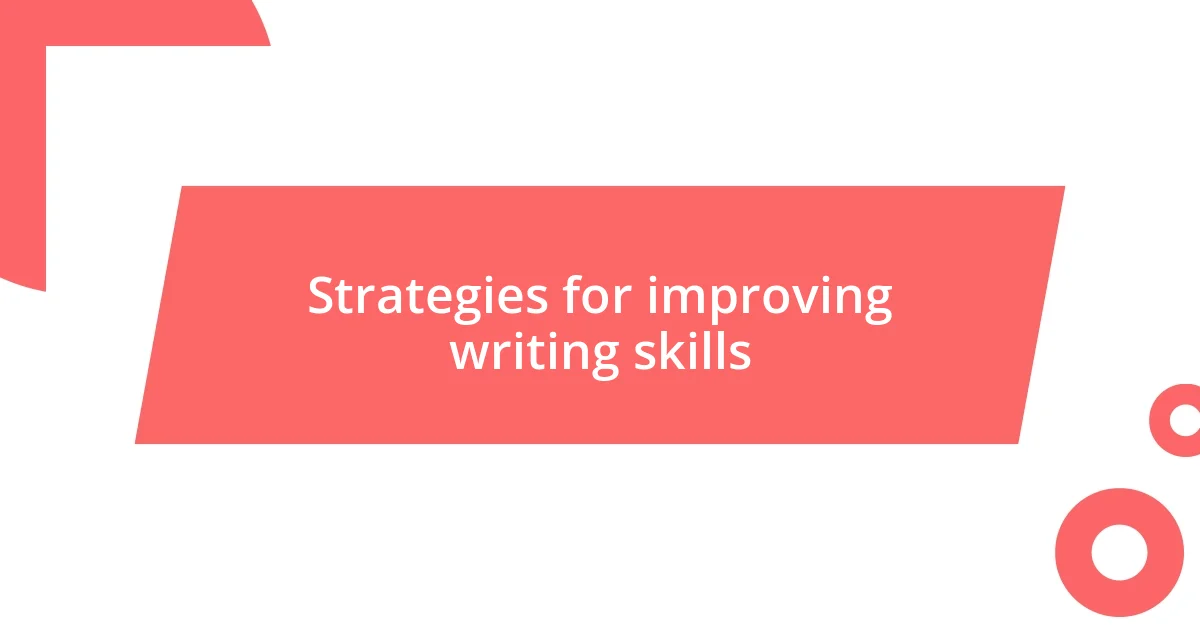
Strategies for improving writing skills
One effective strategy I’ve adopted to improve my writing is to establish a regular revision routine. In the past, I would rush the rewriting process, but I’ve realized that giving my pieces time before revisiting them offers a fresh perspective. For instance, after setting a draft aside for a few days, I often catch errors or awkward phrases that I missed during the initial writing. Have you tried stepping away from your work? It can be like putting on a new pair of glasses—everything suddenly becomes clearer.
Another tactic that has greatly benefited my writing is reading widely and diversely. By immersing myself in various genres, from fiction to academic texts, I’ve absorbed different styles and techniques. I remember one summer where I challenged myself to read a book a week. It was a delightful journey, and I found my own voice evolving as I experimented with different structures and vocabularies. Can you recall a book or article that changed the way you think about writing? These experiences serve as a powerful reminder of the endless possibilities.
Lastly, I’ve learned the importance of setting writing goals. Initially, I’d sit down with vague intentions, feeling overwhelmed by possibilities. Now, I set specific, achievable objectives for each session—like completing a certain number of words or polishing a particular section. I vividly recall a time when my goal was simply to write for 20 minutes without stopping. That small commitment lifted a weight off my shoulders and often led to longer, more productive sessions. What goals have you set for yourself? Having that direction can transform your writing experience from daunting to exhilarating.
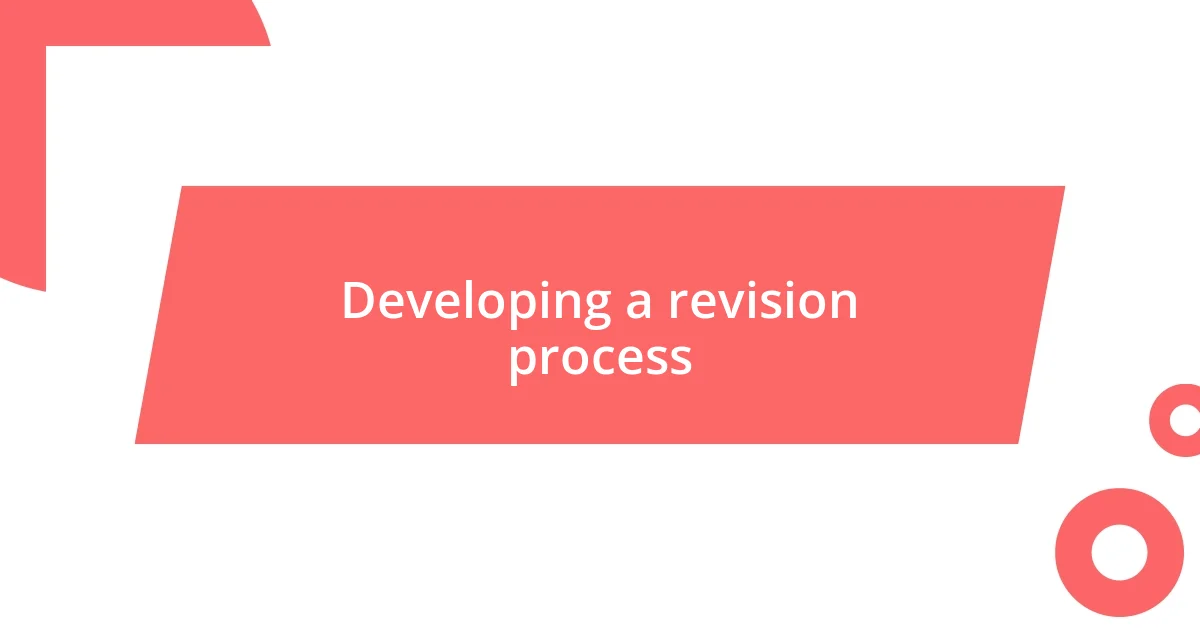
Developing a revision process
Developing a solid revision process has been essential in refining my writing. I try to step back from my drafts for a while before diving into revisions. This pause helps me view my work more objectively—as if I’m reading someone else’s piece. I remember one time, after letting a short story sit for a week, I returned to find phrases that felt clunky, and some plot points that didn’t quite make sense. The clarity that comes from distance is often surprising, isn’t it? It’s a bit like waking up from a dream; when you look back, things make so much more sense.
When I revise, I’ve learned to be systematic. I break down my process into specific stages: first, I focus on the overall structure and flow. Then, I tackle sentence-level details. This approach removes the overwhelming feeling of trying to fix everything at once. Once, while revising a poem, focusing on the rhythm made a huge difference. I realized that some lines didn’t have the beat I intended, and adjusting them opened up the whole piece. Isn’t it thrilling when a single change can elevate your work? That’s what I strive for with every revision.
Another trick I’ve adopted is to read my work aloud during revisions. Hearing the words helps me catch awkward phrasing and allows me to feel the emotions in my writing. I vividly recall the first time I did this; I was nervous to say my thoughts out loud, but doing so revealed how some lines felt flat while others sparkled. It was a game-changer! Have you ever tried this? It transforms the revision process into more of a performance, turning each reading into an opportunity to connect emotionally with the text.
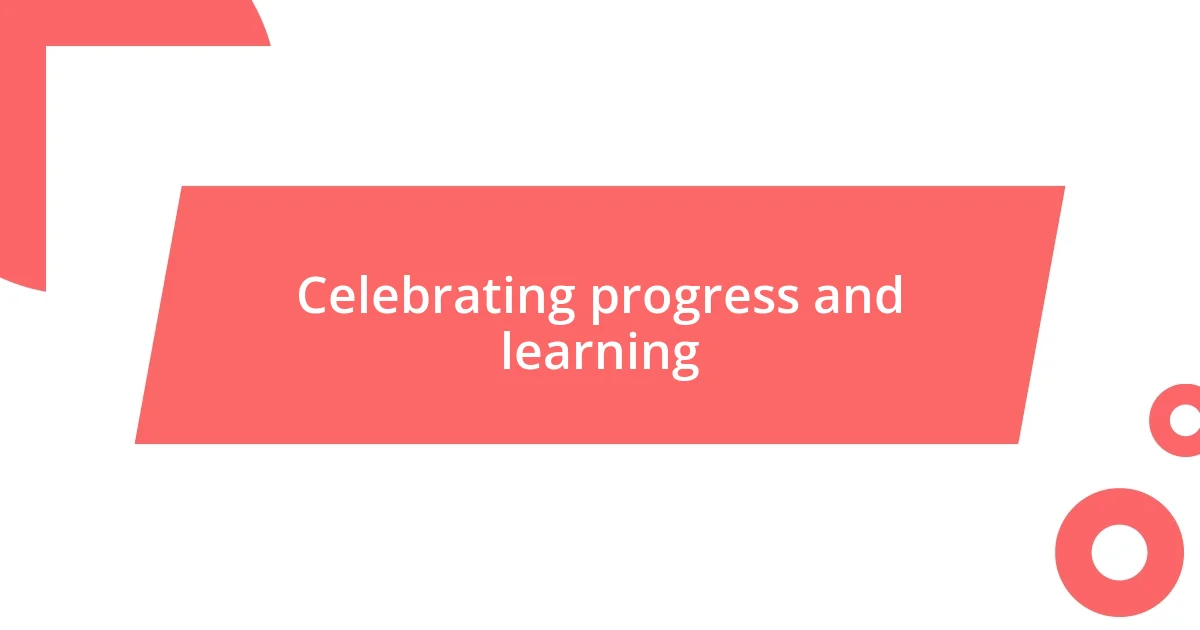
Celebrating progress and learning
Celebrating progress is vital for any writer’s journey. I remember my first written piece—an article that felt like a monumental task. I thought it was terrible, yet, looking back, I see how far I’ve come since then. Each error I encountered was a stepping stone, highlighting my growth and resilience. Isn’t it fascinating how mistakes can transform into invaluable lessons?
As I reflect on my writing evolution, one experience stands out: sharing my work with others. The initial fear of criticism was daunting, but the feedback I received was encouraging and constructive. That moment when someone appreciated my writing style taught me that celebration isn’t just about perfection. It’s about recognizing how far we’ve progressed and embracing the journey. Have you ever had that moment where someone else’s acknowledgment made you step back and appreciate your effort? It’s those small victories that deserve a hearty cheer.
I’ve also learned that celebrating progress involves acknowledging the little wins—like completing a chapter or mastering a new technique. The sense of achievement I feel after reaching a small goal often fuels my motivation for the next. I vividly recall finishing my first draft of a novel. I danced around my living room, feeling a rush of joy! Have you ever celebrated a personal milestone, no matter how small? Those moments remind us that every step forward is worth honoring.










